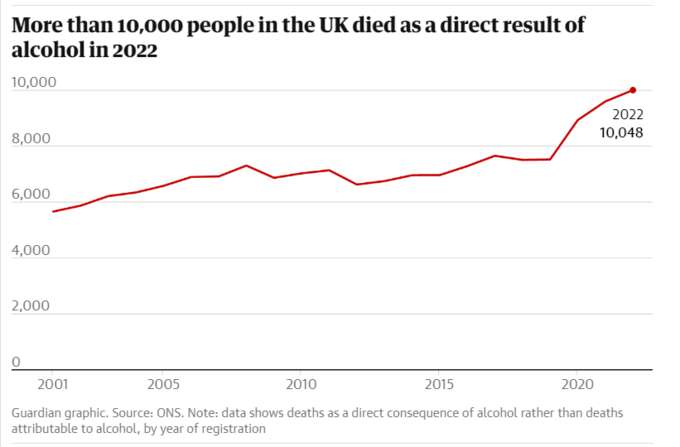Alcohol abuse costs England £27bn annually
Experts call for higher taxes and tougher regulation as research shows cost to NHS, other public services and economy
The cost of alcohol abuse is laid bare in a new study that shows £27bn a year being spent in England on the health and social harms of drinking.
The research that found the extra burden on the NHS, social services, the criminal justice system and the labour market cost at least 37% more than in 2003, when comparable research by the Cabinet Office estimated the costs at between £18.5bn and £20bn.
Using the same methodology, the Institute of Alcohol Studies (IAS) calculated that alcohol cost the health service £4.9bn a year, of which more than £3bn was from alcohol-related A&E visits and hospital admissions.
Official figures released in April showed that a record 10,048 people in 2022 died from alcohol-specific causes – the highest level since records began in 2001. Drinking has been linked to numerous health conditions including seven types of cancer, cardiovascular disease, cirrhosis, stroke and digestive problems.
Alcohol also has a much wider impact on individuals and society. The IAS study put the cost of alcohol to the criminal justice system at £14.6bn, with more than 4m alcohol-related crimes. Social services spend nearly £3bn a year dealing with the impact of drinking on individuals and families.
In the wider economy, the study estimates £1bn is lost as a result of unemployment due to alcohol use, and nearly £4bn through lost productivity.

The costs to society are not evenly felt, the IAS found, with the per capita impact of drinking highest in the north-east and lowest in the south-west.
Across the population, the average cost per head of alcohol harm is £485 a year, rising to £562 a year for people living in the north-east.
The Commons health and social care select committee is due to hear evidence on alcohol harms next week as part of its inquiry into preventing ill health from drinking, smoking, drugs and gambling.
Dr Katherine Severi, the IAS chief executive, said the data was compelling. “As a country we cannot afford to sit back and do nothing. The government should develop a comprehensive alcohol strategy to tackle this rising harm, which would have a knock-on effect of reducing the financial burden too,” she said.

Responding to the figures, clinicians and public health experts reiterated the need to make alcohol more expensive, and harder for younger people to buy, and to make it easier for local authorities to control its availability in their areas.
Dr Sarah Clarke, the president of the Royal College of Physicians, said: “Urgent action is needed to tackle the harm caused by alcohol. The cost to individuals and society is huge and growing year on year. We are calling for increased duty on alcohol, health warnings and nutritional information on labelling and restrictions on alcohol marketing. This will significantly improve public health and help to reduce the strain on an NHS workforce currently facing overwhelming demand.”
William Roberts, the chief executive of the Royal Society for Public Health, said alcohol remained one of the biggest risk factors for preventable diseases. “There are a range of public health interventions that could help minimise alcohol-related harm. These include measures like minimum unit pricing and empowering local leaders to restrict advertising,” he said.
Alice Wiseman, the vice-president of the Association of Directors of Public Health, also called for minimum unit pricing and tougher regulation. “The alcohol industry’s huge marketing machine needs to be regulated much more rigorously so that we are no longer bombarded with the message that alcohol is a safe, attractive product,” she said. “What’s needed now is for the government to take action and develop a new alcohol strategy so that we can drive down the increasing, and unacceptable, cost of alcohol harm.”
Matt Lambert, the chief executive of the Portman Group, which represents the alcohol industry in the UK, said the IAS had failed to take into account the significant direct economic contribution of the alcohol industry or the wider economic and social benefits of moderate and responsible alcohol consumption in society.
“We fully recognise the impact that alcohol misuse has on health, social and police services, which is why the industry remains committed to promoting moderate drinking and supporting partnerships which tackle harm at a local level including antisocial behaviour and underage drinking,” he said. “It is also important to remember that an increasing majority in the UK drink responsibly, and harms such as binge-drinking, alcohol-related crime and drink-driving have fallen significantly over the last decade.”
A Department of Health and Social Care spokesperson said: “Through our 10-year drug strategy, supported by £532m, we are helping up to 54,500 more people receive alcohol and drug support, and we are also funding specialist alcohol care teams in hospitals in England with the highest rates of alcohol harm and socioeconomic deprivation.
“Last August the government also introduced reforms to alcohol duty, meaning products are taxed directly in proportion to their alcohol content, and we are reviewing the official cost of alcohol harm estimates to support us in our efforts to address the harms associated with alcohol.”
Read more similar news:
Comments:
comments powered by Disqus


































